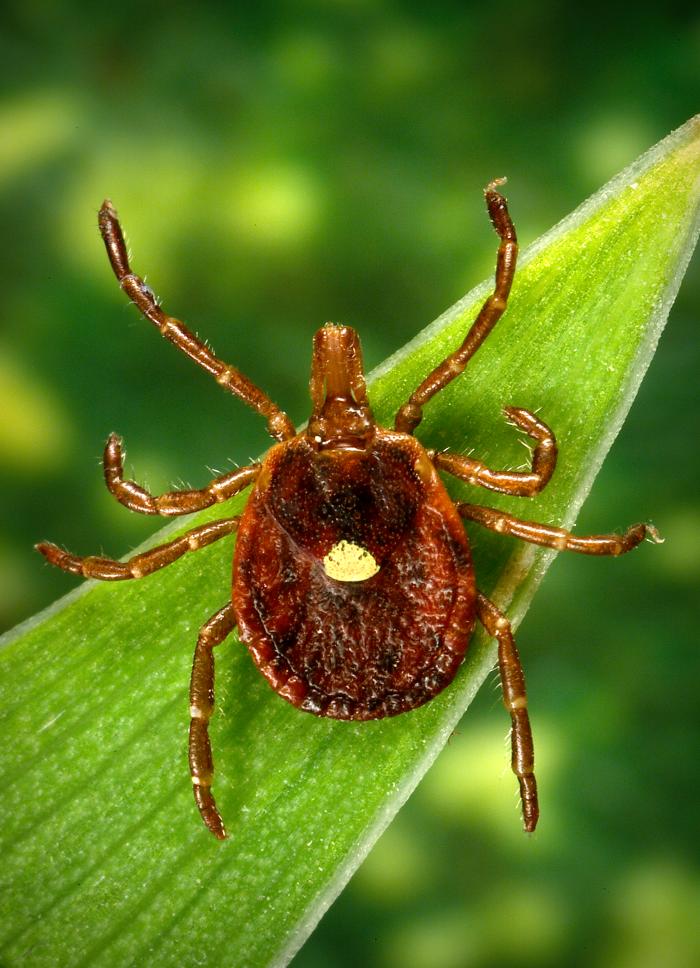The Curious Connection Between Ticks and Red Meat Allergy
 Jeffrey Wilson, MD, is Assistant Professor of Medicine in the Division of Asthma, Allergy and Immunology at the University of Virginia. Wilson attended UVA Medical School, where he earned a PhD in immunology and a medical degree as part of the National Institutes of Health-sponsored Medical Scientist Training Program. He went on to pursue an internal medicine residency at University of Utah before returning to UVA for a clinical fellowship and additional post-doctoral research. Wilson’s research interests focus on the tick-acquired red meat allergy, alpha-gal syndrome.
Jeffrey Wilson, MD, is Assistant Professor of Medicine in the Division of Asthma, Allergy and Immunology at the University of Virginia. Wilson attended UVA Medical School, where he earned a PhD in immunology and a medical degree as part of the National Institutes of Health-sponsored Medical Scientist Training Program. He went on to pursue an internal medicine residency at University of Utah before returning to UVA for a clinical fellowship and additional post-doctoral research. Wilson’s research interests focus on the tick-acquired red meat allergy, alpha-gal syndrome.
The menagerie of buds, blooms and blossoms that accompany spring in Virginia are a delight, but those with allergies are well aware this can come with mixed blessings of runny noses, congestion, itching, sneezing and wheezing. Perhaps less obvious, as we emerge from our homes to enjoy the longer days and warmer temperatures, are other allergy instigators lurking in the mix, and it’s not just the bees and wasps. Though better known for their role in transmitting infections like Lyme disease, Ehrlichiosis and Rocky Mountain Spotted Fever, ticks have recently been recognized for causing an unusual allergy to red meat.
Historically, red meat allergy was thought to be very rare, but a series of discoveries in the mid-2000s - many of which occurred here at the University of Virginia - led to the unexpected observation that there were many people in the Southeast experiencing severe allergic reactions a few hours after eating beef or pork. Because these reactions are caused by IgE allergic antibodies targeting a carbohydrate called “alpha-gal” (more specifically, galactose-alpha-1,3- galactose), the syndrome is now commonly known as the alpha-gal syndrome. Classic symptoms include itchy hives and gastrointestinal distress. Some patients have anaphylaxis, requiring emergency care. Recent epidemiological studies confirm that alpha-gal syndrome is a major cause of adult food allergy in many states in the Southeast and coastal Atlantic, with central Virginia being a particular hotspot. At UVA, we recently found that of 267 employees recruited for a COVID-19 antibody study, 2.6% had symptoms and testing consistent with alpha-gal syndrome.
 Several species of ticks can be found in the United States. Three are predominant in Virginia and surrounding states: the lone star tick (Amblyomma americanum), the blacklegged deer tick (Ixodes scapularis) and the American Dog Tick (Dermacentor variabilis). The latter two species are important vectors for infectious diseases, but the lone star tick is the major culprit for alpha-gal syndrome. The reasons that lone star bites, in particular, often lead to alpha-gal syndrome are not fully understood. Recent studies have shown that lone star ticks produce alpha-gal in their saliva during a bloodmeal. Their bites also often lead to a strong local allergic immune response in the skin, and individuals who experience prolonged itching after a tick bite seem to be most at-risk for developing the syndrome.
Several species of ticks can be found in the United States. Three are predominant in Virginia and surrounding states: the lone star tick (Amblyomma americanum), the blacklegged deer tick (Ixodes scapularis) and the American Dog Tick (Dermacentor variabilis). The latter two species are important vectors for infectious diseases, but the lone star tick is the major culprit for alpha-gal syndrome. The reasons that lone star bites, in particular, often lead to alpha-gal syndrome are not fully understood. Recent studies have shown that lone star ticks produce alpha-gal in their saliva during a bloodmeal. Their bites also often lead to a strong local allergic immune response in the skin, and individuals who experience prolonged itching after a tick bite seem to be most at-risk for developing the syndrome.
For those with outdoor jobs or pursuits, avoiding ticks can be a challenge. Ticks have three life stages – larval, nymph and adult – and, depending on species and life stage, can be active for much of the year. Wearing long pants when in the woods, brush or high grass is helpful, as is carrying out routine tick checks. Chemical deterrents are also an important part of prevention. Sprays such as DEET and picaridin can be applied topically to the skin, and permethrin can be used to treat apparel, footwear and even outdoor gear. Permethrin also has the added advantage of lasting several weeks after being generously applied to clothing and gear, so it does not require application with each outing. Further resources for tick education and avoidance measures can be found from the Virginia Department of Health, and the University of Rhode Island administers a helpful website that maps tick activity by month.
With barbeque season coming into full swing in Virginia, it is a good reminder to be tick aware when landscaping a yard, tending a garden, walking the dog, enjoying a hike in the woods, or engaging in other outdoor activities. A little bit of preparation can go a long way toward preventing tick bites. And for those who are unlucky and do develop the alpha-gal syndrome, take some assurance in the fact the allergy tends to fade over time as long as you can stay away from more ticks.
- A Revolution in the Air: The Wright Brothers Take to the Sky on December 17, 1903
- Musings on National Violin Day
- Making the Promise Real: How a UN Tax Convention Can Fulfill the UNDHR’s Vision
- UVA Club of Atlanta: Virtual Pilates Class
- UVA Club of Vietnam: J-Term Farewell Social
- UVA Club of Atlanta: UVA Women's Basketball at Georgia Tech